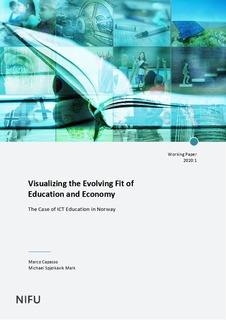Visualizing the Evolving Fit of Education and Economy : The Case of ICT Education in Norway
Abstract
Our study suggests a pattern of methodological steps aimed at an efficient visualization of the fit between an education and an economy. The steps help to detect cross-sectoral skills, originating in a given education path, and to connect them to the evolution of the labour market. Our procedure utilizes statistics derived from labour flows and builds upon the recent scientific literature on skill-relatedness. As an empirical application, we analyse the fit of ICT higher education with the Norwegian economy, using data on intersectoral labour flows (years 2009–2017). Our procedure is then used to analyze the Norwegian job market for ICT-educated people, suggesting the existence of cross-sectoral ICT skill-relatedness which could explain the ongoing dynamics. With the methodological steps we identify sectors linked to the “ICT-sector” as being a skill hub, but also find links to the public sector, suggesting the public sector being attractive to ICT-educated people, and links to other skill-related communities containing higher education and R&D as well as data analysis and processing. Finally, the methodology identifies skill-related communities, such as finance and offshore, which are isolated, in terms of skill-relatedness, from the rest of the economy and appear to be islands in the Norwegian economy.

